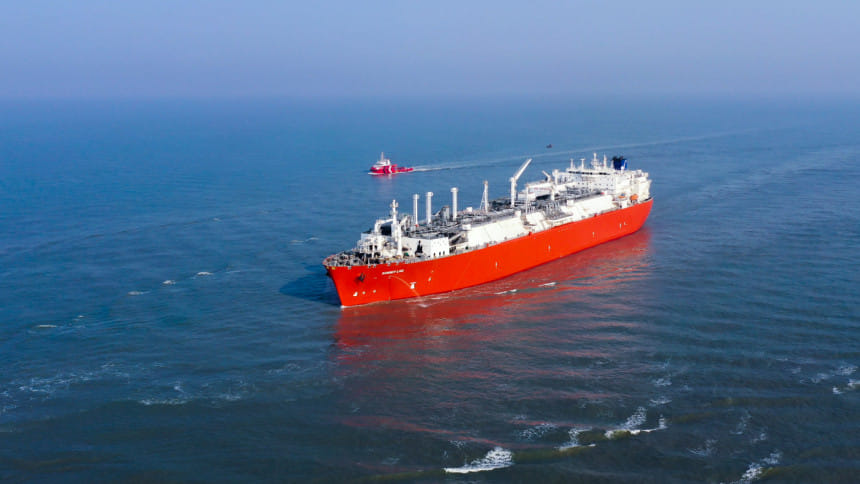Iran-Israel conflict may hit fuel supply

Bangladesh may face disruptions to its fuel imports if the conflict between Iran and Israel escalates further, according to industry experts and officials.
The country depends heavily on shipments that pass through the Strait of Hormuz, the narrow maritime gateway into the Persian Gulf. About a fifth of the world's oil exports move through this passage.
Like many Asian nations, Bangladesh depends on fuel from the Middle East. Energy-rich countries such as Saudi Arabia, Kuwait, Qatar, Bahrain, the UAE, Iraq and Oman all transport oil and gas through the strait.
Industry experts said the route could be at risk if tensions worsen. Iran has already threatened to close the waterway unless Israel halts its attacks.
A closure would severely disrupt supplies, as Iran sits on one side of the strait and Oman and the UAE on the other.
China, India, Vietnam, Singapore, Indonesia and Malaysia are the major sources of refined oil for Bangladesh. These countries import crude mainly from Middle Eastern countries.
Bangladesh Petroleum Corporation (BPC) imports crude from Saudi Arabia and Abu Dhabi, while Petrobangla brings in liquefied natural gas (LNG) from Qatar.
Private gas companies also buy liquefied petroleum gas (LPG) from Iraq and Oman.
If the Strait were to close, no alternative route would be practical for moving oil from Saudi Arabia or Qatar.
Crude from Abu Dhabi could be diverted through Fujairah Port, avoiding Hormuz, but officials said this would push up freight costs.
Large vessels of around 200,000 tonnes usually operate through Fujairah. Bangladesh mainly uses smaller ships of 120,000 tonnes, which face difficulties loading there. Chartering larger vessels would further drive up costs.
During the fiscal year 2023-24, Bangladesh imported 67 lakh tonnes of fuel, including 15 lakh tonnes of crude from Saudi Arabia and Abu Dhabi and 52 lakh tonnes of refined oil from other Asian nations, according to BPC data.
Crude oil is shipped from Saudi Arabia's Ras Tanura Port and the UAE's Jebel Dhanna and Fujairah Ports. LNG comes from Qatar's Ras Laffan Port.
"All fuel products used in Bangladesh are imported from the Middle East," said Abdul Mannan Patwary, director for planning at Petrobangla. "If the Iran-Israel conflict intensifies, it will definitely have negative impacts. Our fuel import costs will increase."
Speaking on condition of anonymity, former senior BPC officials said global fuel prices have already started climbing, even though the conflict has not escalated into full-scale war.
On June 13, Israeli missiles struck Iran's Tehran refinery, one of the largest in the world with a daily capacity of 225,000 barrels. The attack sent global oil prices soaring by nearly nine percent.
BPC, which had cleared its dues with foreign suppliers thanks to stable prices earlier this year, now faces fresh pressure as costs rise.
BPC officials said fuel is imported in line with national demand, and several letters of credit (LCs) have been opened for July shipments.
Every month, crude oil arrives through the Strait of Hormuz.
"We are in constant communication with our fuel suppliers. Our main concern is keeping supplies flowing rather than the price hike," said AKM Azadur Rahman, BPC's director for commercial and operations.
"If ship movements through Hormuz stop, we will not be able to import fuel, even at higher costs," he added.
Diesel prices stood at 78.90 dollars a barrel on June 9, according to London-based firm Platts. After the missile strike, the price rose to 85 dollars on June 13 and climbed further to 86.79 dollars by June 16.
Brent crude was 66.59 dollars a barrel on June 9. By June 13, it had risen to 70.50 dollars and reached 76.81 dollars on June 16. In May, Brent crude averaged 61.55 dollars a barrel, while diesel was 76.03 dollars.
MOUNTING CONCERNS AT BPC
BPC officials said they are increasingly worried about both rising prices and the growing risk of war in the Persian Gulf.
Saudi Aramco recently sent a shipment of crude oil to BPC. The tanker MT Nordic Freedom, carrying 100,000 tonnes, left Ras Tanura on June 16 and has since passed safely through Hormuz.
The BPC is now focused on the safe arrival of another shipment from Abu Dhabi National Oil Company, due to leave for Bangladesh on July 6-7 with 100,000 tonnes of crude.
Officials also recalled how a Bangladeshi commercial vessel was hit by a missile during the Russia-Ukraine war.
Despite the tension, Finance Adviser Salehuddin Ahmed yesterday said the government will not raise fuel prices immediately. "We bought at the previous price, so there will be no impact on fuel prices," he told reporters at the Secretariat.
He said the government is keeping a close eye on the situation. "Although global prices have risen slightly, our current orders remain unaffected," he added.

 For all latest news, follow The Daily Star's Google News channel.
For all latest news, follow The Daily Star's Google News channel. 



Comments